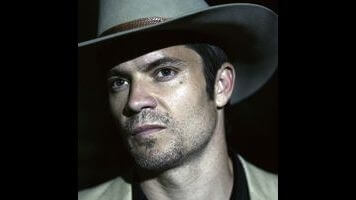Justified: “The Hunt”

No one ever means what they say on Justified. For most of the characters, that’s a natural side effect of positions in the criminal fraternity. To say anything of substance is to risk self-incrimination, so entire paragraphs of crucial meaning must be housed in metaphors and inflections. Language can never be just workmanlike on this show, not when everything from basic exposition to deadly threats must be kept hidden yet remain unmistakably present in the constant stream of one-liners. It’s no surprise then that the dialogue has always been such a highlight of the viewing experience (and the Elmore Leonard experience more broadly). And it’s not just the criminals who engage in this carefully coded doublespeak: Raylan has long employed on-the-nose hypotheticals and strategically unfinished sentences to threaten suspects without ever quite doing so explicitly, and Art gets in the fun tonight with his interrogation of Avery Markham. The transcript of that exchange might well read like a friendly conversation, yet the inflections—and, yeah, the fact that it happens on an episode of Justified—leave zero doubt of how dangerous this particular topic is for both parties.
“The Hunt” is a masterclass for these elliptical conversations, but what elevates this episode to the top tier of Justified entries is that it also has moments of utter, terrifying honesty. Walton Goggins is, as ever, first among equals here. Of all the strengths he brings to the role of Boyd Crowder, perhaps none is more impressive than the layering he is able to bring to every line. As I detailed above, it isn’t remarkable in and of itself that Boyd always couches his true intent in idle, if loquacious, small talk. No, what really sets Boyd apart is Goggins’ ability to impart every level of his dialogue with the same genuine belief in what he’s talking about. When he muses to Ava about why Devil and Cousin Johnny never thought to just come to him if they were so unhappy with their roles in the outfit, he isn’t just saying these things to signal to Ava that he knows of her own attempt to flee to Limehouse. Boyd conveys a genuine curiosity about the failings of his former confederates and of the world in which both they and he must toil. He betrays his blind spots, as he so hides his own culpability that even Ava has to remind herself that Devil and Johnny’s fears of reprisal from Boyd didn’t stay hypothetical for very long.
But this is what sets Boyd apart from Avery Markham. When Avery completes the call with Walker and quizzes Seabass as to where his loyalties really lie, there is no question of what he genuinely cares about. Even as Avery tries to adopt the no-bullshit pose of confronting Seabass with the grim truth of Walker’s situation, he still maintains the illusion that he is selling his henchman on real freedom when, really, he’s just bribing him to go away for a while. And sure, maybe that’s just a difference of terminology, but intent matters here: Avery is a salesman, whereas Boyd is a philosopher. As such, it’s not exactly a surprise that one is a hell of a lot more straightforward in his goals than the other. Avery has gotten this far because he’s disciplined and he’s charismatic—he’s still an idiot to the extent that all Elmore Leonard criminals are fundamentally idiots, but he’s less of one than any Justified character this side of Mags Bennett—but he only expends the bare minimum of effort in hiding his own selfish, corrupt intentions, be it from a henchman like Seabass or a cop like Art. The truth of Avery is hidden just below the surface, because there really isn’t very much to that surface.
Boyd, on the other hand, is so twisted and so tangled by his own schemes and aspirations—not to mention his own undeniable genius—that he defies easy categorization as a Justified villain. There’s a reason he’s an outlaw and not a criminal, after all. All that isn’t new to “The Hunt,” but what is just about unprecedented his how he acts in that final scene, in which Ava admits that she has been Raylan’s confidential informant. In that scene, Walton Goggins strips away all the layers of obfuscation that have defined Boyd for the last six seasons, as he desperately tries to convince not just Ava but himself that their love is still salvageable.











![HBO teases new Euphoria, Larry David, and much more in 2026 sizzle reel [Updated]](https://img.pastemagazine.com/wp-content/avuploads/2025/12/12100344/MixCollage-12-Dec-2025-09-56-AM-9137.jpg)




























